 |
Mr. Jeff Batten is a Ph.D. candidate working on replication of a ssRNA plant virus of grasses in Dr. Karen-Beth G. Scholthof's laboratory at
Texas A&M University. He received his M.S. in Plant Pathology also at Texas A&M University working on a fungal virus under the direction of Dr. Raymond D. Martyn. Mr. Batten is the 1998-1999 Chair of the APS Graduate Student committee and a founding member of the Future Plant Pathologists of America (FPPA). FPPA is an unofficial group of graduate students that formed during the 1997 meeting in Rochester, NY. Mr. Batten organized a graduate student listserver through Texas A&M that has been used to discuss plant pathology related issues, and was used as a forum to develop and organize the "World Food Crisis" symposium.
|
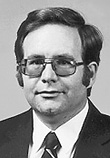 |
Dr. Lee Campbell is a Professor of Plant Pathology at North Carolina State University. He received his B.S. and M.S. in Plant Pathology at Colorado State University; and his Ph.D. (Plant Pathology) at Pennsylvania State University. His research activities include spatial and temporal aspects of plant disease epidemics; ecology of soilborne pathogens and epidemiology of root disease; effects of global change on plant diseases and geophytopathology, history of plant pathology. He is a co-author/editor of several books including Viruses in Vectors: Transovarial Passage and Retention (APS Press, 1986), Introduction of Plant Disease Epidemiology (John Wiley & Sons, 1990), Epidemiology and Management of Root Diseases (Springer-Verlag, 1994), and co-producer of a VHS video on Healthy Plants-Our Future (APS Press, 1989). His recent book, co-authored with Paul D. Peterson and Clay S. Griffith, is The Formative Years of Plant Pathology in the United States, and will be available in August, 1999.
|
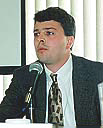 |
Mr. Alex Avery is currently with the Center for Global Food issues at the Hudson Institute. He has written several articles related to food issues including Farming to Sustain the Environment. (Hudson Briefing Report, 1996), Solving Population Growth (Washington Times, Nov. 21,1996) and Scaring Consumers Away from Good Health (http://www.cato.org/dailys/8-28-98.html). In addition, he was an invited speaker at a conference on Biotechnology: Products, Policy, And The Public - Third World Issues (The Jackson Laboratory, August 13 - 15, 1998).
|
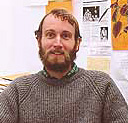 |
Dr. Chris Mundt is a Professor of Plant Pathology at Oregon State University. He received his Ph.D. from North Carolina State University. His research interests include plant disease epidemiology; host plant resistance; population genetics of plant pathogens, and sustainable agriculture. He was involved in formulating the 1994 APS resolution on World Population/Hunger.
|
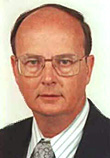 |
Dr. Richard Lee received his B.S. from Ft. Hays Kansas State University, Hays. He completed his M.S. (1973) and Ph.D. (1977) in plant pathology at Kansas State University, Manhattan. He was a postgraduate research plant pathologist with G. Nyland and T. Shalla at the University of California, Davis, before joining the University of Florida as a virologist at the Citrus Research and Education Center, Lake Alfred. This past year he has been on sabbatical leave with the United Nation's Food and Agriculture Organization, Plant Protection Division, Rome, Italy. His research program involves graft-transmissible agents of citrus and their control. He is interested in sustainable agriculture and promotion of certification programs to manage virus diseases.
|
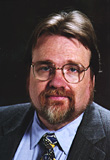 |
Dr. Paul Thompson received a Ph.D. in Philosophy from the State University of New York at Stony Brook. For sixteen years he held a joint appointment with Philosophy and the College of Agriculture at Texas A&M University. In 1997, he assumed the Joyce and Edward E. Brewer Chair in Applied Ethics at Purdue University. Thompson has authored or edited seven books on topics in agriculture and ethics, including The Ethics of Aid and Trade (Cambridge U. Press, 1992) and Agricultural Ethics: Research, Teaching and Public Policy (Iowa State U. Press, 1998). He is a founding member and former president of the Agriculture, Food and Human Values Society, and a two time winner of the American Agricultural Economics Asssociation Award for Excellence in Communication. |
